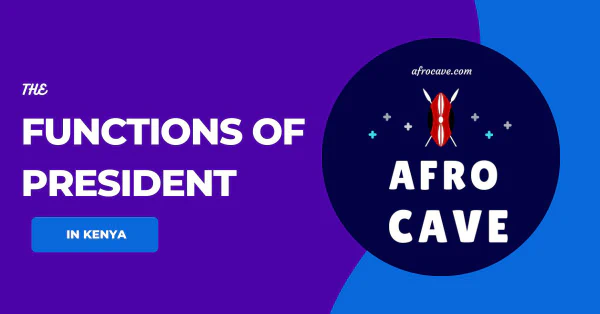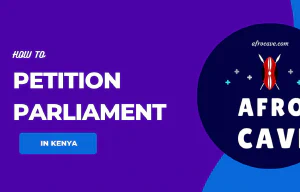Powers and Functions of the President of Kenya
- Author Gĩthĩnji
- Updated on:

The Kenyan Constitution states the powers and functions of the president of Kenya. The president plays an important role in the leadership of the country and also as the head of the Cabinet.
Kenya has a presidential system of governance and people elect the president directly.
The powers and functions of the president of Kenya are diverse. Articles 131 and 132 of the Kenyan Constitution stipulate these powers and functions of the president in Kenya. This article explores the role of the president of Kenya as the Constitution enumerates.
Table of ContentsShow/Hide
Functions of the President in Kenya
Article 132 of the Kenyan Constitution says the following with regards to the functions of the president of Kenya.
1. Role related to Parliament
After every general election in Kenya, the president shall address the opening of each newly elected parliament.
The president shall also address a special sitting of Parliament once every year and may address Parliament at any other time.
The president shall also once every year report, in an address to the nation, on all measures taken and the progress achieved to realise the national values in Article 10 of the Constitution. He or she shall also publish the details of the measures and progress mentioned above in the Kenya gazette.
The president shall submit a report for debate to the National Assembly on the progress made to fulfil the international obligations of the Republic of Kenya.
2. Role of Hiring and Firing
This function of the president of Kenya regards nomination, appointment, and dismisal of certain government officials.
The President shall nominate and, with the approval of the National Assembly, appoint, and may dismiss–
- Cabinet Secretaries, in accordance with Article 152 of the Constitution;
- the Attorney-General, in accordance with Article 156;
- Secretary to the Cabinet in accordance with Article 154;
- Principal Secretaries in accordance with Article 155;
- High Commissioners, Ambassadors and Diplomatic and Consular representatives; and
- any other State or public officer whom the Constitution requires or empowers the President to appoint or dismiss, and only in accordance with the Constitution.
3. Head of the Executive
As the head of the Executive arm of government, The President shall–
- chair Cabinet meetings;
- direct and coordinate the functions of ministries and government departments; and
- by a decision published in the Gazette, assign responsibility for the implementation and administration of any Act of Parliament to a Cabinet Secretary, to the extent not inconsistent with any Act of Parliament.
4. Other Functions
Other functions of the president of Kenya include the following:
- perform any other executive function provided for in the Constitution or in national legislation.
- except as otherwise provided for in the Constitution, may establish an office in the public service in accordance with the recommendation of the Public Service Commission;
- receive foreign diplomatic and consular representatives;
- confer honours in the name of the people and the Republic;
- subject to Article 58, declare a state of emergency; and
- with the approval of Parliament, declare war.
Some of the other executive functions the president may perform as provided in the Constitution or in national legislation include to:
- suspend a county government according to Article 192 of the Constitution.
- consider, approve and assent to any bill passed by Parliament or refer the same bill back to parliament (Article 115).
- represent the country in national and international fora and events.
- come up with the portfolio structure for the national executive to respond to the functions and competencies that the law assigns the national government.
- chair the National and County Government Coordinating Summit.
The president shall ensure that the actions of the relevant cabinet secretaries fulfil the international obligations of the Republic of Kenya.
Powers of the President of Kenya
Now that we have seen the functions of the president of Kenya, what are their powers?
The President–
- is the Head of State and Government;
- exercises the executive authority of the Republic, with the assistance of the Deputy President and Cabinet Secretaries;
- is the Commander-in-Chief of the Kenya Defence Forces;
- is the chairperson of the National Security Council; and
- is a symbol of national unity.
The President shall–
- respect, uphold and safeguard this Constitution;
- safeguard the sovereignty of the Republic;
- promote and enhance the unity of the nation;
- promote respect for the diversity of the people and communities of Kenya; and
- ensure the protection of human rights and fundamental freedoms and the rule of law.
The President shall not hold any other State or public office.
A decision of the President in the performance of any function of the President of Kenya under the Constitution shall be in writing and bear the seal and signature of the President.
Power of mercy
On the petition of any person, the President may exercise a power of mercy in accordance with the advice of the Advisory Committee on the Power of Mercy, by–
- granting a free or conditional pardon to a person convicted of an offence;
- postponing the carrying out of a punishment, either for a specified or indefinite period;
- substituting a less severe form of punishment; or
- remitting (cancel or suspend) all or part of a punishment.
The Advisory Committee on the Power of Mercy comprises of–
- the Attorney-General;
- the Cabinet Secretary responsible for correctional services; and
- at least five other members as prescribed by an Act of Parliament, none of whom may be a State officer or in public service.
- «Previous Budgeting Process for the National Government in Kenya
- Next» Role of Independent Electoral and Boundaries Commission (IEBC)


